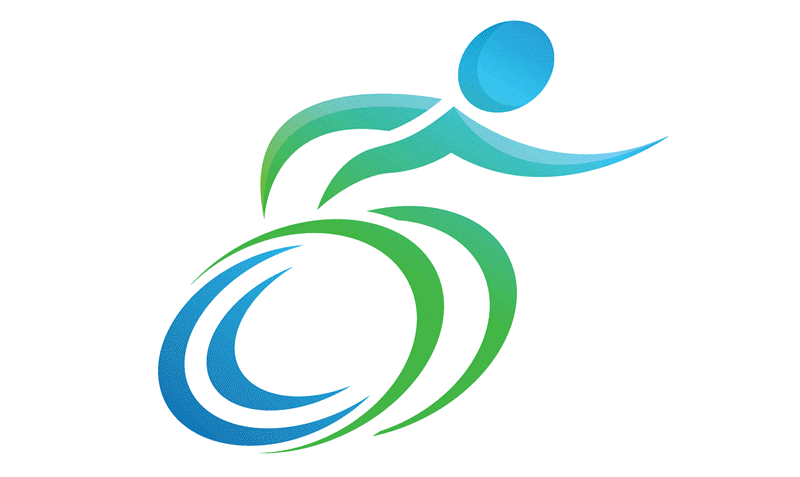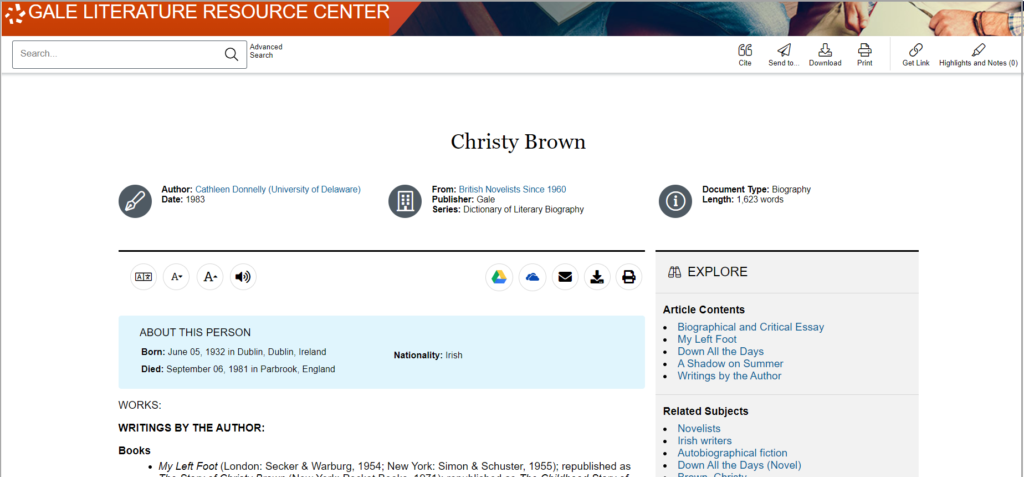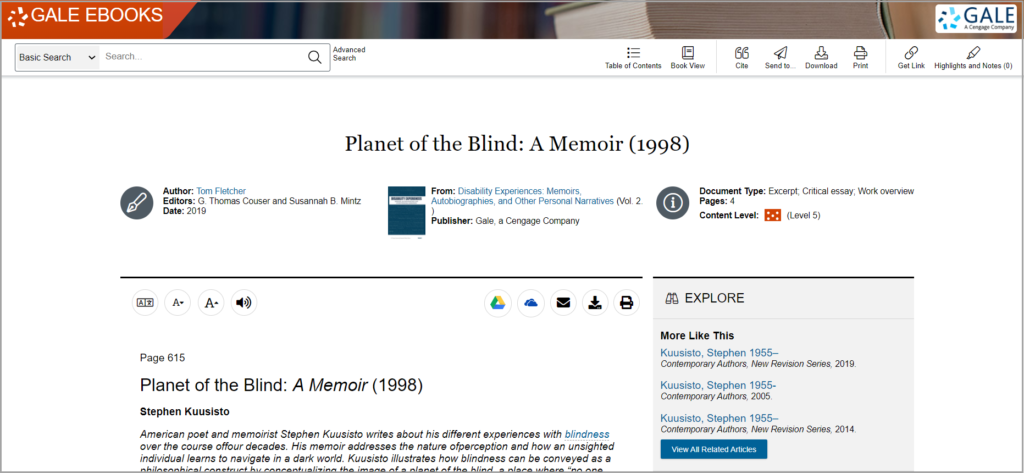| By Carol Schwartz, Sr Content Developer, Gale |
Beginning in 1992, the United Nations called for December 3 to be an international day of celebration for people living with disabilities. Their theme for 2020 is “Not All Disabilities Are Visible,” highlighting the diverse nature of disabling conditions, which can include mental illness, brain injuries, addiction, neurological disorders, learning differences, and cognitive dysfunctions, among others. The purpose of the day is fourfold:
● Celebration: Recognize and value diversity and cherish the role we all play, regardless of ability.
● Learning: Understand the experiences of people living with a disability.
● Optimism: Look toward a world in which a person isn’t characterized by their disabilities, but rather their abilities.
● Action: Make a commitment to create a world characterized by equal human rights.
To mark International Day of People with Disabilities, Gale offers information to support the second goal, learning. Gale’s literature program boasts a wealth of diverse and rich resources that explore the lived experience of disabilities of all types. Biographies, literary analyses, and full text of related periodical articles can be found in Gale Literature Resource Center, Gale Literature Criticism, and Gale eBooks. Below are four examples of persons living with disabilities, with links to relevant Gale content as well as a list of other links to broader topics in disability studies through literature.
Christy Brown (1932–1981), Irish painter and writer
Little was known about cerebral palsy in Ireland when Christy Brown was diagnosed as a child. He affirmed his mother’s belief that—despite popular but uninformed opinion—he was not a “mental defective” when he began to use his left foot, the only body part he could fully control, to write. His memoir, My Left Foot (1954), recounts his early life and the beginning of his career in painting; his subsequent fiction often featured characters with physical disabilities.
“Christy Brown,” an overview of the author’s life and work, in Contemporary Literary Criticism, Vol. 63, available in Gale Literature Criticism
“Christy Brown,” an overview of the author’s life, in Dictionary of Literary Biography, Vol. 14: British Novelists since 1960, available in Gale Literature Resource Center
“Christy Brown,” an overview of the author’s life, in Contemporary Authors, available in Gale Literature Resource Center
“Me, Thyself and I: Dependency and the Issues of Authenticity and Authority in Christy Brown’s My Left Foot and Ruth Sienkiewicz-Mercer and Steven B. Kaplan’s I Raise My Eyes to Say Yes,” an article from Journal of Literary & Cultural Disability Studies, available in Gale Literature Resource Center
“My Left Foot,” an examination of the author’s memoir, in Disability Experiences, available in Gale eBooks
Temple Grandin (1947–), American animal scientist
Temple Grandin’s 1986 memoir,Emergence: Labeled Autistic, is among the first autobiographical accounts of autism. In addition to books on animal behavior, she also wrote many more on the subject of autism, including Thinking in Pictures: and Other Reports from My Life with Autism (1995).
“Temple Grandin,” an overview of the author’s life, in Contemporary Authors, available in Gale Literature Resource Center
“Emergence: Labeled Autistic,” an examination of the author’s memoir, in Disability Experiences, available in Gale eBooks
“Temple Grandin: A Life Devoted to Animals,” an NPR interview with Grandin, available in Gale Literature Resource Center
“Temple Grandin’s Squeeze Machine as Prosthesis,” an article from Journal of Modern Literature, available in Gale Literature Resource Center
“Learning from Temple Grandin, or, Animal Studies, Disability Studies, and Who Comes after the Subject,” an article from New Formations, available in Gale Literature Resource Center
Stephen Kuusisto (1955–), American educator and writer
In Planet of the Blind (1998), Stephen Kuusisto writes about his experiences with blindness, and addresses the nature of perception and how an unsighted individual learns to navigate in a dark world. His second memoir, Have Dog, Will Travel (2018), centers on his relationship with his guide dog, Corky. Themes of blindness frequently appear in his poetry.
“Stephen Kuusisto,” an overview of the author’s life, in Contemporary Authors, available in Gale Literature Resource Center
“Lyric Anger and the Victrola in the Attic: An Interview with Stephen Kuusisto,” an article from Journal of Literary & Cultural Disability Studies, available in Gale Literature Resource Center
“Planet of the Blind: A Memoir,” an examination of the author’s memoir, in Disability Experiences, available in Gale eBooks
“’A River That No One Can See’: Body, Text, and Environment in the Poetry of Stephen Kuusisto,” an article from Journal of Literary & Cultural Disability Studies, available in Gale Literature Resource Center
Kenzaburō Ōe (1935–), Japanese writer
Novelist and Nobel laureate Kenzaburō Ōe’s son, Hikari, was born with a severe brain hernia, which left him with several disabilities, including autism, impaired vision, communication disabilities, intellectual and developmental disability, and epilepsy. Ōe’s A Healing Family (1995) describes his relationship with his son, who learned to express himself through musical composition. Ōe also explored themes relevant to his relationship with his son in many of his works of fiction.
“Kenzaburō Ōe,” an overview of the author’s life, in Contemporary Authors, available in Gale Literature Resource Center
“Kenzaburō Ōe,” an overview of the author’s life and work, in Contemporary Literary Criticism, Vol. 303, available in Gale Literature Criticism
“Kenzaburō Ōe,” an overview of the author’s life and short stories, in Short Story Criticism, Vol. 176, available in Gale Literature Criticism
“A Healing Family,” an examination of the author’s memoir, in Disability Experiences, available in Gale eBooks
“Overview: The Pinch Runner Memorandum,” available in Gale Literature Resource Center
“Overview: ‘A Personal Matter,’” available in Gale Literature Resource Center
“Review of A Healing Family,” from World Literature Today, available in Gale Literature Criticism
More Gale literary resources on persons living with disabilities
“Disabilities in Children’s Literature”
“Mental Illness in Short Fiction”
In Gale eBooks:
Disability Experiences: Memoirs, Autobiographies, and Other Personal Narratives
Read more Literature Diversity Series blogs >>
nike foamposite 2000 black women shoes heels – Blanco – 991 – DJ3180 – Nike Air Max 97 By You Zapatillas personalizables | Detailed Pictures Of the Off – team jordan 2 price – White x Air Jordan 4 “Sail” – Grailify



